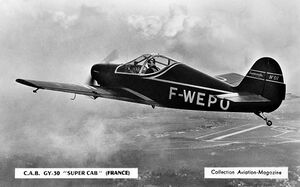Engineering:CAB Supercab
| GY-30 Supercab | |
|---|---|

| |
| Role | Utility aircraft |
| Manufacturer | Constructions Aéronautiques du Béarn (CAB) |
| Designer | Yves Gardan |
| First flight | 5 February 1954[1] |
| Number built | 7 |
| Developed into | SIPA 1000 |
The CAB GY-30 Supercab was a two-seat light aircraft built in France in 1954, as a further development of the CAB Minicab. The design was performed by Yves Gardan, a onetime employee of French aeronautical company SIPA. Changes incorporated in the Supercab (from the Minicab) included a more powerful engine, greater wingspan, manually retractable undercarriage, and slotted flaps that replaced the split flaps of the Minicab.
Seven units were constructed by CAB before the rights to the design were sold to Gardan's former employer (SIPA), who developed the design into the SIPA 1000. However, due to a downturn in the light aircraft market at that time, only three of the SIPA variant were produced before production was halted.[2]
Specifications
Data from Jane's All The World's Aircraft 1956–57[3]
General characteristics
- Crew: 1
- Capacity: 1 passenger
- Length: 5.50 m (18 ft 1 in)
- Wingspan: 8.20 m (26 ft 11 in)
- Height: 1.65 m (5 ft 5 in)
- Wing area: 10.30 m2 (110.9 sq ft)
- Aspect ratio: 6.5:1
- Empty weight: 400 kg (882 lb)
- Gross weight: 613 kg (1,351 lb)
- Fuel capacity: 70 L (15 imp gal; 18 US gal)
- Powerplant: 1 × Continental C90 air-cooled four-cylinder horizontally opposed piston engine, 67 kW (90 hp)
- Propellers: 2-bladed fixed pitch
Performance
- Maximum speed: 275 km/h (171 mph, 148 kn)
- Cruise speed: 235 km/h (146 mph, 127 kn)
- Service ceiling: 5,000 m (16,000 ft)
- Rate of climb: 3.90 m/s (767 ft/min)
- Take-off run to 20 m (66 ft): 340 m (1,120 ft)
- Landing run from 20 m (66 ft): 300 m (980 ft)
Notes
References
- Bridgman, Leonard (1956). Jane's All The World's Aircraft 1956–57. New York: The McGraw-Hill Book Company.
- de Narbonne, Roland (February 2014). "Février 1954, dans l'aéronautique française: Le CAB GY.30 "Supercab": Le petit bolide de Gardan" (in fr). Le Fana de l'Aviation (531): 78–79.
- Taylor, Michael J. H. (1989). Jane's Encyclopedia of Aviation. London: Studio Editions. pp. 123.
- Simpson, R. W. (1995). Airlife's General Aviation. Shrewsbury: Airlife Publishing. pp. 409.
- CAB Supercab on aviafrance.com
- Website of the Association des Proprietaires et Amateurs d'Avions Gardan[yes|permanent dead link|dead link}}]
 |

